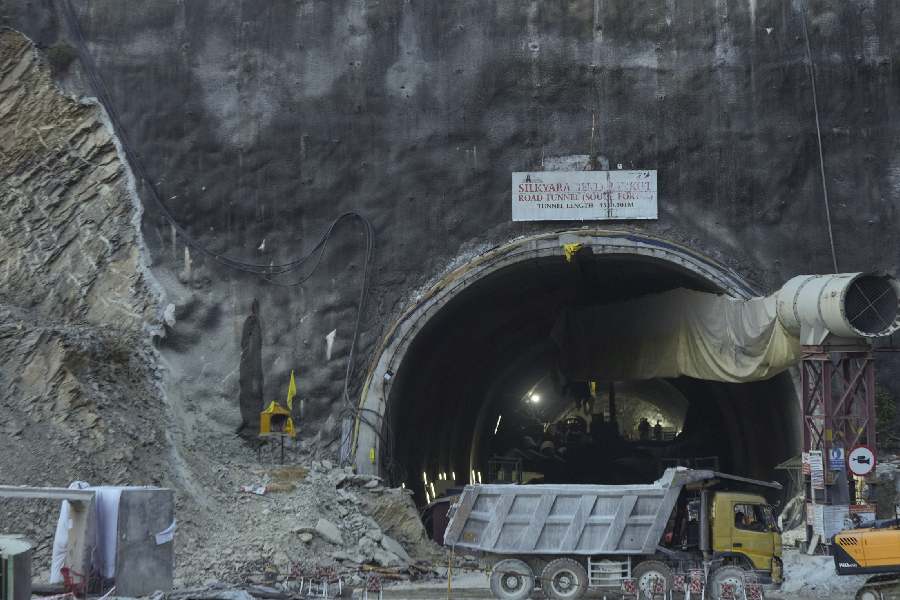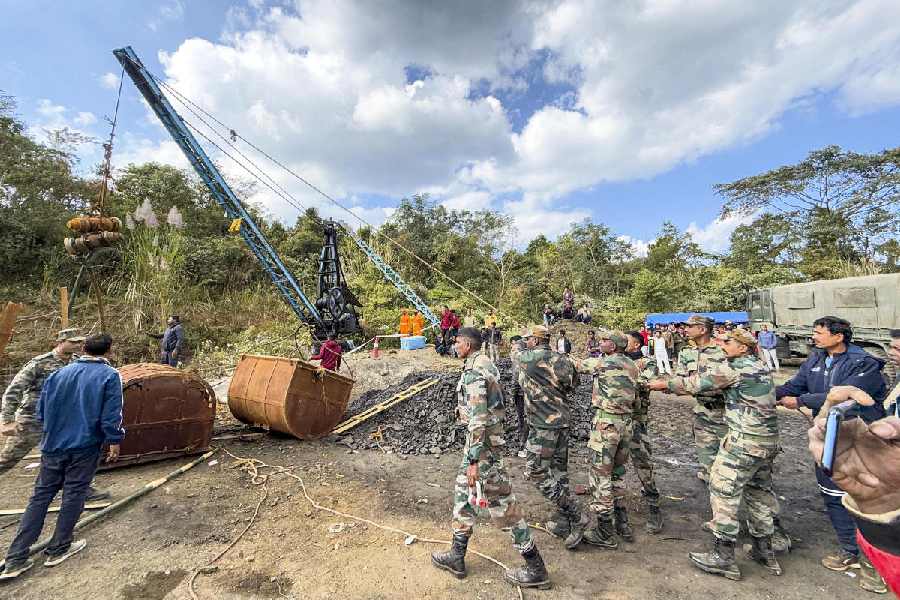The blades of the auger machine drilling through the rubble of the collapsed Silkyara tunnel were on Saturday stuck in the debris, forcing officials to consider switching to options that could drag on the rescue of 41 trapped workers by several days -- even weeks.
On day 14 of the multi-agency rescue mission, officials shifted focus to two alternatives --- manual drilling through the remaining 10- or 12-metre stretch of the rubble or, more likely, drilling down 86 metres from above.
“This operation could take a long time,” National Disaster Management Authority (NDMA) member Lt Gen (retd) Syed Ata Hasnain said at his media briefing.
At the disaster site, international tunnelling expert Arnold Dix repeated his promise of getting the workers out “by Christmas”, which is a month away.
Manual drilling would involve individual workers entering the already bored 47-metre stretch of the rescue passage, drilling for a brief period in the confined space and then coming out to let someone else take over.
This, according to Uttarakhand Chief Minister Pushkar Singh Dhami, could begin as soon as the equipment stuck in the planned escape passage is brought out.
Heavy vertical drilling equipment, already brought to Silkyara, was on Saturday moved up a one-and-a half-kilometre hill road constructed in a couple of days by the Border Road Organisation.
The vertical drilling would begin in the “next 24 to 36” hours, Hasnain said. He indicated that this was quicker of the two main options now being considered.
Drilling through the Silkyara rubble was at standstill for almost the entire day Friday. But the extent of the problem was known Saturday when international expert Dix told reporters that the auger machine was “busted”.
“The drilling, augering has stopped. It’s too much for the auger, it’s not going to do anything more,” he said.
“The mountain has again resisted the auger, so we are rethinking our approach. I am confident that the 41 men are coming home,” he said, insisting that they remained safe.
When pressed to spell out a timeline, Dix said, “I have always promised that they will be home by Christmas.” The 25-tonne drilling machine, now out of commission, includes an auger -- a giant corkscrew-like device with a cutter at its end.
This has so far created a horizontal passage of 46.9 metres into the rubble, out of the estimated total length of 60 metres.
A steel chute had been pushed through, in sections, up to this point where the rotary blades are stuck, followed by the long auger.
About 20 metres of the auger in the chute has been cut out, Uttarakhand CM Dhami told reporters. A plasma cutter is being airlifted from Hyderabad to tackle the remaining 25 metres.
The development has added to the anxiety of families of trapped workers, some of whom are camping near the disaster site and talking occasionally to them through the communication system set up by the rescue workers.
Once that happens, manual drilling would begin, he said.
"For the last two days we are being assured by officials that they are being evacuated soon. But something or the other happens and the process gets delayed," said Devender Kisku from Banka in Bihar.
His brother Virender Kisku is among the trapped workers.
The rescue effort began November 12 when a portion of the under-construction tunnel on Uttarakhand's Char Dham route collapsed following a landslide, cutting off the exit for the workers inside.
The workers are in a built-up two-kilometre stretch of the tunnel. They are being sent food, medicines and other essentials through the six-inch wide pipe.
Mobile phones have been sent in through this tube and a landline established, officials said. Board games like Ludo were also provided.
An endoscopic camera has been used to get live visuals from beyond the collapsed stretch.
Except for the headline, this story has not been edited by The Telegraph Online staff and has been published from a syndicated feed.











